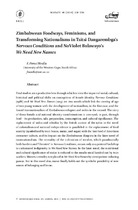Zimbabwean foodways, feminisms, and transforming nationalisms in Tsitsi Dangarembga’s nervous conditions and no violet bulawayo’s we need new names
Abstract
Food studies are a productive lens through which to view the impact of social, cultural, historical and political shifts on conceptions of female identity. Nervous Conditions (1988) and we need new names (2013) are two novels which link the coming of age of two young women with the development of nationalism, in the first case, and the forced transnationalism of Zimbabwean refugees and exiles in the second. The story of these female and national identity transformations is conveyed, in part, through food-its production, sale, preparation, consumption, and cultural significance. The replacement of sadza and mbodza by the British cuisine of the 1960s in the novel of colonialism and national independence is paralleled in the replacement of food scarcity (symbolized by ngo beans, maize, and sugar) with the fast food of American consumer culture, and its impact on the Zimbabwean diaspora in the later novel of transnationalism. The centrality of the cultivation of mealies, which paradoxically both burdens and "liberates" in Nervous Conditions, occurs only as a pastoral backdrop to caricatured indigeneity in We Need New Names. In the later novel, the nutritional and cultural significance of maize is reduced to the mealie meal handed out by ngo workers. Maize's centrality is replaced in We Need New Names by constipation-inducing guavas. But in this novel also, maize finally holds out the symbolic possibility of new senses of belonging and home.

